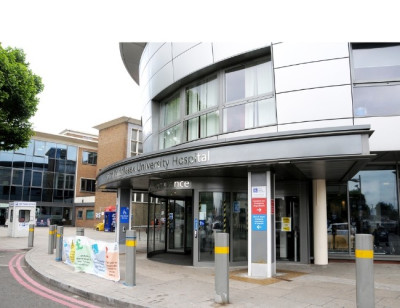The pelvic health physiotherapy service at the Royal Free London offers specialist assessment and rehabilitation of pelvic, bladder and bowel dysfunction, for both men and women.
Patients are often referred from obstetrics, gynaecologists and colorectal and urology surgeons for our services.
Examples of patients referred to us include women in pregnancy with pain in the pelvis and men with urinary incontinence following prostate surgery.
Our aim is to diagnose a patient’s condition and set out a treatment plan with them to achieve the best possible outcome.
Outpatient services
Our specialist outpatient services for women include treatment for pregnancy-related pain, sexual pain, bladder or bowel problems and those with pelvic floor muscle dysfunction.
Our specialist outpatient services for men include treatment for bladder or bowel problems.
Inpatient services
Our inpatient service provides support and advice on our postnatal and gynaecology wards to women who have a high risk of pelvic floor dysfunction after birth or gynaecological surgery.
Our experienced team of pelvic health physiotherapists provide assessment and treatment for the following problems:
- stress urinary incontinence: leaking urine during a run, cough or sneeze
- urinary frequency, urgency and urge incontinence: the feeling of needing to empty the bladder frequently and/or rush to get to the toilet in time, often accompanied with loss of control of urine
- faecal/flatus incontinence: the loss of control of bowels and/or wind
- faecal urgency: the feeling of needing to empty the bowel with little warning
- obstructive defecation: difficulty emptying the bowels
- pelvic pain/vulval pain/dyspareunia: pain with sexual intercourse and/or chronic pain in the pelvic region
- perineal trauma: injury to the pelvic floor from childbirth
- pelvic organ prolapse: anterior or posterior vaginal wall and uterine descent
- pregnancy and postnatal-related musculoskeletal conditions: pelvic girdle pain, back pain, coccyx pain, hip pain, rib pain and carpal tunnel syndrome
- men's health: bladder and bowel care after prostate surgery, pelvic floor training for erectile dysfunction, bowel care following bowel surgery, and pelvic pain
When you visit your physiotherapist, they will discuss your current problem with you and ask a few questions to better understand your concerns. Depending on your needs, your physiotherapist may assess your back, hips and pelvis, neck and hands and provide you with appropriate advice. It's recommended that you wear comfortable clothing that allows for movement during the appointment.
If your issue relates to pelvic floor dysfunction, a physical examination may be necessary, which often involves a vaginal examination. It's important to note that your pelvic floor doesn't work alone and relies on many other systems to function correctly. Treatment often includes exercises that focus on improving the pelvic floor muscle and alleviating your symptoms. After the internal examination, your physiotherapist will design an individual recovery program suitable for you.
You are welcome to bring a chaperone with you during the examination if you feel more comfortable. Please inform your physiotherapist if you would like to arrange for a formal chaperone (another staff member) or bring a friend or relative as an informal chaperone. If no chaperone is available, you will have the opportunity to reschedule your appointment.
If you have any questions or concerns regarding the examination or treatment, please don't hesitate to speak to your physiotherapist. They will be happy to discuss any issues with you.
Our gynaecology department is proud to be leading the way in gynaecological surgery by offering the vNOTES (vaginal Natural Orifice Transluminal Endoscopic Surgery) technique for suitable patients. We are one of only around 15 gynaecology units in the UK providing this cutting-edge, minimally invasive procedure. vNOTES represents a significant advancement in patient care, allowing us to perform keyhole surgery through the vagina, completely avoiding abdominal incisions.
The Benefits of vNOTES
vNOTES offers numerous benefits that have transformed the way we care for our patients:
- Minimal Pain: Patients experience significantly less pain compared to traditional laparoscopic surgeries, which means a much smoother recovery.
- No Visible Scars: One of the most remarkable aspects of vNOTES is that it leaves no visible scars in the abdomen as instruments and camera used are introduced through the vagina.
- Quicker Recovery: Most of my patients are able to go home in less than six hours after the procedure, which is a testament to the efficiency and effectiveness of this technique.
How we use vNOTES
We have used vNOTES to treat a range of conditions, including ectopic pregnancies, removing ovarian cysts, performing female sterilisation, and conducting hysterectomies. It is particularly advantageous for patients with a high BMI, where conventional keyhole surgery can be more complex. We are also expanding its use by working closely with our breast surgery colleagues to offer the vNOTES route for the removal of ovaries and fallopian tubes in women who carry the BRCA gene (carriers of this gene have a 60% increase in risk of ovarian cancer), providing a less invasive option for those at higher risk of cancer. Understanding your BRCA status can be vital for making informed decisions about your health, including considering preventive surgeries like those we offer using the vNOTES technique.
Outpatient referrals
At Barnet Hospital and Chase Farm Hospital, referrals are accepted only from Royal Free London consultants and from the North Central London Integrated Care System for obstetrics and gynaecology. We do not accept Barnet GP referrals.
The Royal Free Hospital can only accept referrals from within the Royal Free London NHS Foundation Trust.
Obstetrics
- Self-referral (any address/GP, if delivering at the Royal Free London)
- Camden CCG GPs.
Gynaecology
- via Royal Free London consultant (any address/GP)
- Camden CCG GPs.
Pelvic, Obstetric and Gynaecological Physiotherapy (POGP) is a professional network for physiotherapists.
The POGP has produced a variety of information booklets on a range of conditions and topics in women and men’s health.
The booklets have been written by qualified women and men’s health physiotherapists with reference to evidence and research where available and are updated regularly.
Along with our own information resources, we also use the following POGP booklets:
- Exercise in pregnancy
- Pelvic girdle pain in pregnancy
- Information after having a baby (fit for future)
- Exercise and advice after the loss of your baby
- Fit for Pregnancy
- Fit for Birth
Video playlist: pelvic health and wellbeing during pregnancy
To watch these videos in one of 15 other languages, click below.
Video playlist in other languages
- Pelvic floor exercises for men
- Pelvic floor muscle exercises and advice: for trans men, trans masculine and non-binary people (who were assigned female at birth)
- Pelvic floor muscle exercises and advice: for trans women, trans feminine and non-binary people (who were assigned male at birth)
 Translate
Translate



